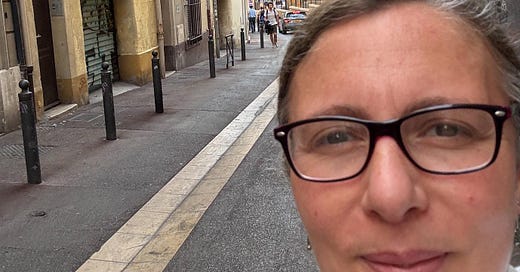Do you sometimes wonder why I am so obsessed with plants and fermentation? Do you think I am a little overzealous? If anything, I think I am not zealous enough! If you are looking for a bit more understanding into why we should all be motivated to eat more plants, both fermented and non-fermented, read on. This month’s missive will give you a taster of the health-related research that is going on into plants, and included is just a small selection of what was covered in one conference; the Food Bioactives and Health Conference I attended in Marseille a few weeks ago. Most exciting for me, was learning about two “new” bioactive compounds in brassica vegetables.
But before we get into that, you may remember that I had the privilege of a kimchi intensive tour of South Korea back in April this year for my PhD research. I have nearly finished making a small video series to give you a taster of that experience. Over the coming months, I will be publishing those videos here, so do look out for them. The first one is coming very soon.
If it is face-to-face, hands-on kimchi-related learning you seek, then sign up for the kimchi know-how class I am running with @Caroline Gilmartin in November.
For those interested in my HOXY (herbal oxymel) research, I lovingly pressed and then posted the first samples to the lab for testing last week. I am comparing an alcoholic extract of Cacao nibs to an oxymel extraction for key bioactive compounds. I have been working with oxymels for around 7 years now and I am excited about them as a “gateway” herbal medicine. They are made using vinegar, honey and medicinal herbs and they taste incredible. Watch this space for analysis results and I plan to do the same testing on the other key herbs I use to make my HOXYs. The results will tell me more about whether an oxymel is an effective solvent for extracting herbal bioactive compounds. If you want to see what the pressing process involves, check out my Substack “Notes” section here for the one showing me pressing the cacao HOXY.
Other opportunities to expand your understanding of plants:
Power of Plants Festival
You only need to read a fraction of this newsletter to know that plants matter. What better way to explore what plants do for us and what we can do for them than to attend the Power of Plants Festival in Shropshire this July? Whether you are an experienced herbalist, horticulturalist, or just waking up to how important plants might be, this really is a fabulous festival, run by the National Institute of Medical Herbalists. I will be there in my capacity as a NIMH director and you will also be able to find me on the Betonica School of Herbal Medicine stand, happy to chat and with a selection of my HOXYs for sampling.
Bread and Roses
Are you the fulcrum? Often supporting others? A giver of your energies? Could you do with receiving some nourishment, yourself, letting go of the traces for a little while? Or if not now, might you need a break by the time we get to November? Bread and Roses retreat aims to offer you breathing space, whilst nourishing you with the fundamentals of life, like damn good sourdough bread, pure beauty, in the form of herbs, song and connection and some joy. Join us!
Now let’s dig in to some of that plant and health-related research…
Some reasons to eat plants; intel. from the Food Bioactives and Health Conference 2025 (FBHC)
The first intriguing intel was gleaned at the airport. I travelled with Hannah Robson and her rucksack failed the scanner and she was pulled over. The operative said “do you have fruit in your bag”. Hannah responded in the affirmative. The offending banana was extracted and eyeballed in an accusatory manner. My mind was whirring as to why bananas might be dangerous on planes. Hannah did train as a sniper in her youth, but I can’t really see her throwing a banana at anyone and doing much damage.
It turns out that the scanners are able to pick up toxic chemicals and are sensitive enough to pick up pesticides on fruit. The operative imparted the sage advice “organic veg doesn’t set it off”. Hannah’s retort: “but this banana IS organic”. Or is it? I am hoping Hannah will discuss this episode with the organic. veg. shop from which she bought it. The motto for the Royal Society is “nullis in verba” which translates to “take nobody’s word for it”. This motto would serve us all well when navigating the modern food environment.
Keep reading with a 7-day free trial
Subscribe to Choosing our reality to keep reading this post and get 7 days of free access to the full post archives.





